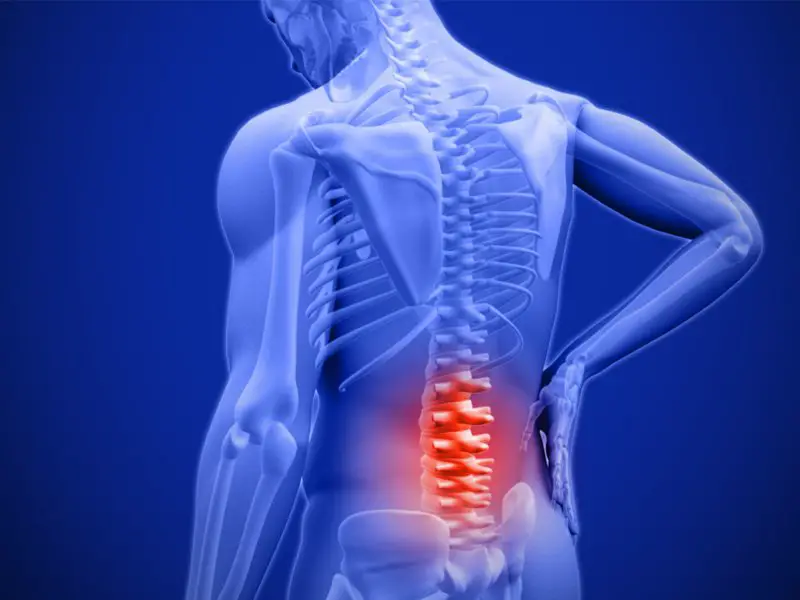Why Go To An Orthopedic Doctor For Back Pain
Most us will experience back pain at some point in life. While most back pains resolve on their own or with conservative treatments, some need serious medical attention. Back pain may be a sign of a serious condition, and it will progressively get worse if left untreated.
If your back pain is not getting better and is limiting the activities you can engage in, see an orthopedic doctor. Why go to an orthopedic doctor for back pain? Why cant your primary care physician just treat it? Orthopedic doctors have specialized knowledge, training, and experience in diagnosing, treating, and preventing musculoskeletal pain. While a primary care physician can treat a plethora of health issues, an orthopedic doctor can do it better.
Risk Factors For Lower Back Pain
Most lower back pain is caused by age-related conditions, underlying disease, or a sedentary lifestyle. Talk with your spine specialist about your personal and family history of back pain to help them identify the potential causes.
Factors that may contribute to lower back pain include:
- being older in age
- not getting enough exercise
- pregnancy
- weight gain
- family history of lower back pain
- occupational risks, such as jobs that require heavy lifting, pushing, pulling, or twisting and
- pre-existing mental health issues, such as anxiety and depression, which can influence how closely you focus on your pain as well as your perception of its severity.
Causes Of Low Back Pain
Causes of low back pain can vary. Some of the conditions we regularly see include:
- Degenerative disc disease or arthritis: Wear and tear can occur on the discs that provide cushioning between the vertebrae in your lower back.
- Herniated disc: Rupture of the discs that provide cushioning between your vertebrae can contribute to back pain.
- Lumbar radiculopathy: The compression of a nerve root in the spinal column can cause pain in the lower back.
- Sacroiliac joint pain: Dysfunction or inflammation of the sacroiliac joint, which is between the bottom of the spine and the pelvis, can cause pain in the lower back, hip, pelvis, and legs.
- Spinal stenosis: The spaces within the spine can narrow and place pressure on the spinal cord and other nerves.
- Spondylolisthesis: A stress fracture can cause a disc in the lower back to shift out of place.
- Spondylosis: A small stress fracture in the discs of the spine can cause low back pain.
- Strains and sprains: Overusing and overstretching muscles in the lower back can contribute to pain.
Also Check: What Causes Pain In The Back Of Your Head
See An Expert For An Accurate Diagnosis
Whether you experience back pain along your spine or concentrated on your lower back, it can make it difficult for you to perform everyday tasks or limit your ability to work or enjoy life. While some back pain is acute and lasts about six weeks, other cases of back pain are chronic and persist for more than three months.
Regardless of the type of back pain you are living with, it is important to see an expert spine doctor or specialist for back pain for an accurate diagnosis and to help determine an individualized back pain treatment plan.
Injections And Other Procedures

If you have severe sciatica, your doctor may suggest an epidural injection. Epidural injections contain a local anaesthetic and steroid to relieve pain and reduce inflammation. Theyre only recommended for sciatica and not non-specific lower back pain.
If your back pain is chronic and other treatments havent helped, your doctor may suggest a procedure called radiofrequency denervation. Its only suitable for certain types of back pain. Your doctor will refer you to a specialist to assess whether it would help you.
Dont Miss: How To Make Your Lower Back Stronger
Don’t Miss: Can Obesity Cause Back Pain
How Is Back Pain Treated
Acute back pain usually gets better on its own. Acute back pain is usually treated with:
- Medications designed to relieve pain and/or inflammation
- analgesics such as acetaminophen and aspirin
- non-steroidal anti-inflammatory drugs such as ibuprofen and naproxen may be sold over the counter some NSAIDS are prescribed by a physician
- muscle relaxants are prescription drugs that are used on a short-term basis to relax tight muscles
- topical pain relief such as creams, gels, patches, or sprays applied to the skin stimulate the nerves in the skin to provide feelings of warmth or cold in order to dull the sensation of pain. Common topical medications include capsaicin and lidocaine.
Exercising, bed rest, and surgery are typically not recommended for acute back pain.Chronic back pain is most often treated with a stepped care approach, moving from simple low-cost treatments to more aggressive approaches. Specific treatments may depend on the identified cause of the back pain.
What Causes Lower Back Pain And When Should I Get Help
Orthopedic back and spine treatment usually starts with conservative approaches that include pain management, physical and occupational therapies, and rehabilitation. The American Academy of Orthopedic Surgeons reminds us that chronic back pain can get worse if left untreated, so it’s important to visit a doctor early on who can start you with the right treatment.
Some of the most common causes of lower back pain include:
Also Check: What Does It Mean When Lower Back Hurts
Family Doctor Or General Practitioner
Most back pain problems are first addressed in the office of an individuals general practitioner or primary care doctor. This is because it is often a pain problem that goes on for a length of time prior to the individual asking for help with it.
The most likely course of treatment if your family doctor is prescribing it will be medication therapy and/or physical therapy regimens. Your general practitioner will likely not be as well appraised of treatments for specific back pain problems as their specialist counterparts, so they might opt to order some tests to confirm their suspicions and then use those findings to refer you to one of the specialists listed below.
Less Common Causes Of Low Back Pain
Inflammation of the joints of the spine sometimes causes back pain. Osteoarthritis is the common form of arthritis and usually occurs in older people. Ankylosing spondylitis is another form of arthritis that can occur in young adults and which causes pain and stiffness in the lower back. Rheumatoid arthritis may affect the spine but you are likely to have other joints affected too.
Various uncommon bone disorders, tumours, infection and pressure from structures near to the spine occasionally cause low back pain .
The rest of this leaflet is mainly about nonspecific low back pain the common type of low back pain.
Dont Miss: What Mattress Firmness Is Best For Lower Back Pain
Recommended Reading: Will Acupuncture Help Lower Back Pain
The Differences In Treatment With Orthopedic Doctors Vs Neurologists
There are a few prominent procedures only each specialty doctor is trained to perform. For instance, only a neurologist is trained to perform surgery inside the dura, the lining of the spinal canal.
For this reason, a neurologist is the best option for treating conditions such as a tethered spinal cord or spinal cord tumor. Conditions such as syringomyelia and Chiari malformation also still fall under the neurologist specialty. On the other hand, such conditions like pediatric and adult scoliosis, spinal deformities, or kyphosis still fall under the realm of an orthopedic doctor.
Today, both types of doctors have developed a friendly working relationship and can work together to provide comprehensive care. Together, they want you to receive treatment for the best end results. But if there are subtle differences in your injuries such as the ones listed above, they would be better addressed by either a neurologist or an orthopedic doctor to achieve the desired outcome and recovery.
AICA Orthopedics employs highly trained, skilled neurologists and orthopedic doctors. Our team strives to provide accurate diagnoses and quality treatment for the source of your injuries or pain.
With knowledge, expertise, and experience, our specialists place patient needs at the top of the priority list in order to provide you specific and individualized care. To learn more about our neurologists and orthopedic doctors, please dont hesitate to .
Recommended Reading: How To Fix A Sore Lower Back
Key Points About Low Back Pain
- Specific treatment for low back pain depends on the cause of the pain and the severity. But it often includes pain medicines and muscle relaxers, physical therapy, and assistive devices such as a back support. It also may include lifestyle changes such as stress reduction, weight loss, and increased physical activity.
- A back rehab program may be used as part of the treatment for low back pain.
- Measures to prevent back pain include using safe lifting techniques, maintaining correct posture, staying at a healthy weight, not smoking, and reducing stress.
Read Also: Is Foam Mattress Good For Back Pain
Don’t Miss: How Do You Relieve Lower Back Pain
What The Orthopaedic Spine Surgeon Treats
We ask Consultant Orthopaedic Surgeon, Mr Khai Lam to put the orthopaedic point of view:Orthopaedic Surgeons spend all their time mending broken bones and are therefore experts in the areas of bone fixation and healing, akin to lumbar spinal fusion.Now it’s true that in today’s environment there is quite a lot of crossover, but, there is still a general perception that neurosurgeons lack an appreciation of spinal biomechanics and bone biology, e.g. spinal fusion. This is partly due to their somewhat lacking neurosurgical postgraduate training curriculum. Orthopaedic Surgeons however, never stop thinking about bone stability and bone healing. In addition, most Orthopaedic Spinal Surgeons work a lot more closely with physiotherapists when treating lower back disorders.So which type of surgeon should you seek out when you suffer from chronic lower back pain? The answer still isn’t obvious….
Why Did Larrys Primary Care Physician Refer Him To You

Dr. Malanga: Larrys primary care physician referred him to me as opposed to a spine surgeon because my specialty in pain and sports medicine approaches care by maximizing conservative, non-operative techniques. The United States has 4 to 6 times the surgical rate of most other countries, so referring to a non-operative spine specialist is the best initial approach for Larry.
Golfers of all ages and physical activity levels can experience bouts of low back pain. Photo Source: 123RF.com.
You May Like: Can Ibd Cause Back Pain
What Kind Of Doctor Treats Back Pain
This depends on your condition or symptoms. If you have no obvious injury that would explain your pain, a good place to start may be to see a physiatrist a specialist in physical medicine. This type of doctor can diagnose back pain problems and determine whether physical therapy or other nonsurgical treatments may help you. A physiatrist may also refer you to an spine surgeon, pain management doctor or other type of back specialist if appropriate.
A spine surgeon who specializes in spine conditions can treat alignment problems and damage to bones or discs of the spine that may be causing back pain. The spine surgeon can also treat complex spine fractures and injuries to the nerves of the spinal cord. Some injuries or conditions may require treatment by an interdisciplinary team of orthopedic or neurologic spine surgeons, pain management doctors, neurologists and/or physical therapists.
In addition to physical damage caused by injuries or spine conditions, degenerative and autoimmune conditions can also create back pain. Rheumatologists treat low back pain and are especially interested in evaluating patients for possible inflammatory disease that can cause it, such as ankylosing spondylitis. Explore the content below to learn more.
Dont Miss: What To Do To Alleviate Lower Back Pain
Complementary And Alternative Techniques Include:
- Acupuncture is moderately effective for chronic low back pain. It involves inserting thin needles into precise points throughout the body and stimulating them , which may cause the body to release naturally occurring painkilling chemicals such as endorphins, serotonin, and acetylcholine.
- Behavioral approaches include:
- Biofeedback involves attaching electrodes to the skin and using an electromyography machine that allows people to become aware of and control their breathing, muscle tension, heart rate, and skin temperature people regulate their response to pain by using relaxation techniques
- Cognitive therapy involves using relaxation and coping techniques to ease back pain
Spinal injections include:Trigger point injections can relax knotted muscles that may contribute to back pain. An injection or series of injections of a local anesthetic and often a corticosteroid drug into the trigger point can lessen or relieve pain.
Don’t Miss: How To Relieve Sudden Lower Back Pain
Back And Neck Treatment Options
The spine doctors on our staff can quickly determine which treatment approaches are best for the pain in your back or neck.
- Nonsurgical treatment options
Non-surgical treatments are often the most appropriate treatments for pain in the lower back or neck. Baylor Scott & White offers a comprehensive program of rehabilitation and physical therapy, including:
- Medication
Sometimes, surgery is determined to be the procedure that will result in the best outcome. The expert spine surgeons on the medical staff of Baylor Scott & White have advanced training in the latest technology and focus on minimally invasive surgical solutions. Treatment methods focus on reducing surgical trauma and pain and accelerating recovery.
Back and neck surgeries include:
A broad range of interventional pain management procedures also are available for the treatment of sciatic nerve pain or pain in the low back or neck. Treatment options include minimally invasive, non-surgical procedures designed to treatânot maskâthe problem.
Interventional pain management procedures include:
Other Conditions That Cause Back Pain In Older Adults
We often see a range of less serious but still painful spine conditions in seniors. Most patients with these conditions will not require surgery. Physical therapy, medication, injectable anesthetics, or a combination of treatments usually can control symptoms.
- Degenerative disc disease, which can cause whole spine pain, and lumbar arthritis, which usually causes low-back pain, commonly develop with age and are considered wear-and-tear conditions.
- Sacroiliitis is an inflammation of the joints that connect your spine and pelvis. This condition can cause pain in the low back, glutes, and upper legs.
- Ankylosing spondylitis is an inflammatory arthritis that causes patients spines to become inflexible, resulting in a continual hunched forward position and spine pain.
- We also check for adult degenerative scoliosis and kyphosis, spine-curving conditions that can result in back pain and weakness in the lower extremities.
Recommended Reading: Does Voltaren Gel Work For Back Pain
Where Can I Get More Information
For more information on neurological disorders or research programs funded by the National Institute of Neurological Disorders and Stroke, contact the Institute’s Brain Resources and Information Network at:
Office of Communications and Public LiaisonNational Institute of Neurological Disorders and StrokeNational Institutes of HealthBethesda, MD 20892
NINDS health-related material is provided for information purposes only and does not necessarily represent endorsement by or an official position of the National Institute of Neurological Disorders and Stroke or any other Federal agency. Advice on the treatment or care of an individual patient should be obtained through consultation with a physician who has examined that patient or is familiar with that patient’s medical history.
All NINDS-prepared information is in the public domain and may be freely copied. Credit to the NINDS or the NIH is appreciated.
Start With A Physiatrist
Unless you need to see a primary care provider for a referral, Dr. Dowdell suggests visiting a physiatrist as your first step. A physiatrist is the primary care doctor of the back, he explains. are fully focused on diagnosis and non-surgical treatment of musculoskeletal issues, so they may have more specialized knowledge than a PCP. Even if youve already told your family doctor about your back pain, its a good idea to talk to a physiatrist nextespecially if whatever youve been trying isnt working.
Also Check: Can Hemorrhoids Cause Back Pain
Which Type Of Doctor Should I Visit For Lower Back Pain
From temporary aches to disabling chronic pain, lower back pain affects millions of people each year. According to the National Institute of Neurological Disorders and Stroke, about 80% of people will experience lower back pain at some time in their lives. There are many kinds of back specialists, so if you’re asking yourself, “Which type of doctor should I visit for lower back pain?,” you’ll want to read on.
Recommended Treatment Options By Neurologists

Neurologists have the advantage of knowing the health of the patients nerves and muscles. In many cases, acute pain is due to strains, muscle damage, or nerve damage. This means the neurologist can then use non-surgical options to treat the condition. The doctor will often recommend physical therapy, lifestyle changes, and rest. Neurologists also encourage techniques like chiropractic care or biofeedback therapy. If the pain persists, medication, and steroid injections come next. With consistent work, acute back pain can clear up.
Also Check: How Can Tight Muscles Result In Back Pain